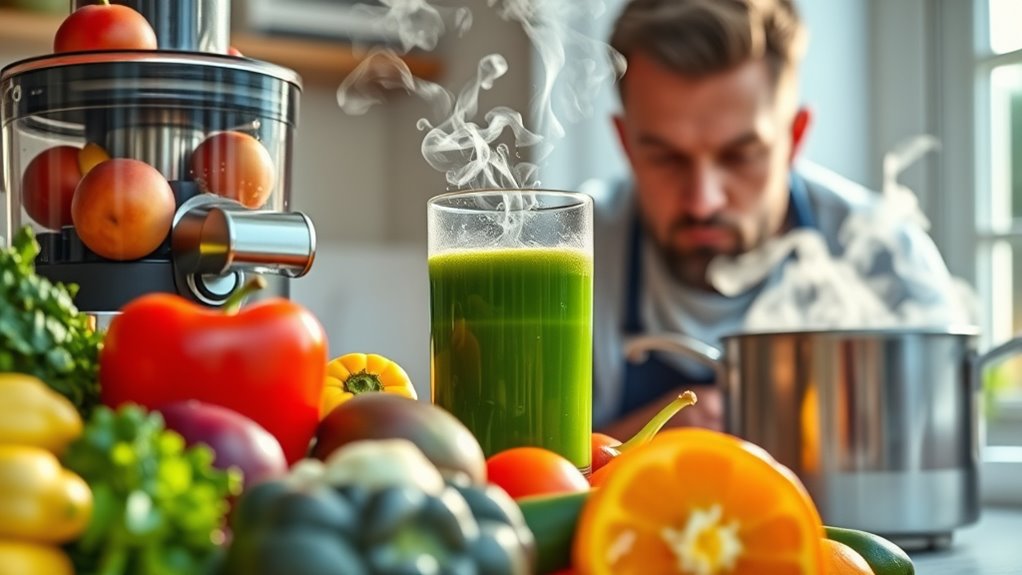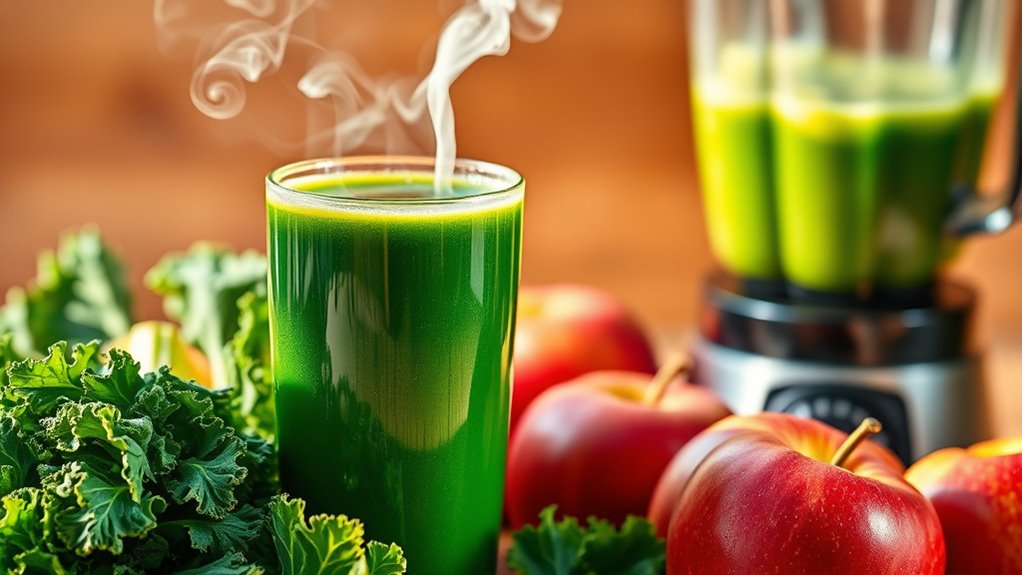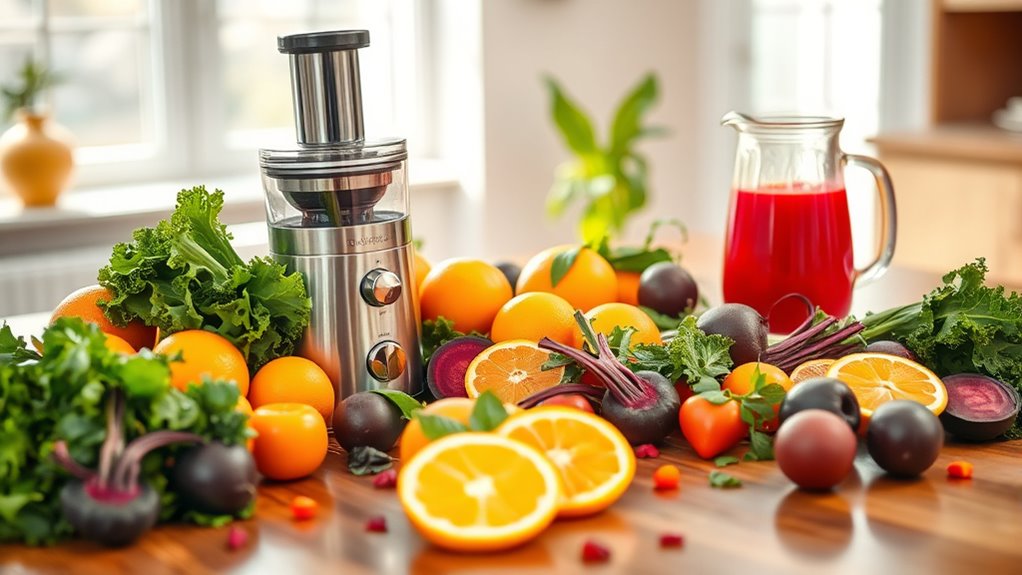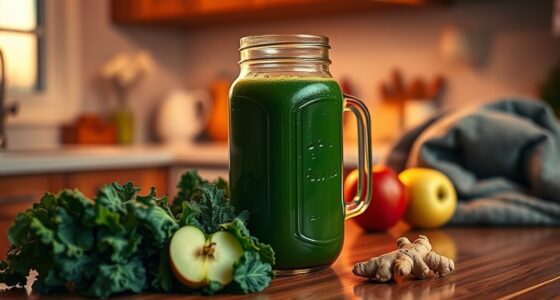Juicing can truly transform your respiratory health! By providing concentrated vitamins and antioxidants, it boosts lung function and reduces inflammation. Ingredients like dark berries, apples, and anti-inflammatory spices like turmeric pack a powerful punch against oxidative stress. Plus, vitamin C-rich options help improve your immune system. Regularly incorporating fresh juices into your diet can lead to better lung capacity and overall wellness. Discover more about the incredible benefits and recipes waiting for you!
Key Takeaways
- Juicing provides concentrated vitamins and minerals that enhance lung function and reduce inflammation, particularly beneficial for conditions like COPD.
- Antioxidants found in fruits like dark berries and tomatoes are linked to a reduced risk of lung cancer and improved respiratory health.
- Anti-inflammatory ingredients such as turmeric and ginger in juices can alleviate lung inflammation and improve overall respiratory function.
- Regular consumption of vitamin C-rich juices supports respiratory health by reducing lung inflammation and boosting the immune system.
- Juicing enhances nutrient absorption, promoting detoxification and leading to better overall lung capacity and fewer respiratory illnesses.
What Is Juicing?

Juicing is the process of extracting juice from fresh fruits and vegetables, which allows you to quickly access essential nutrients. By grinding, squeezing, or pressing these foods, you create a concentrated source of vitamins and minerals that can be easier to consume than whole fruits and vegetables.
The health benefits of juicing are significant, helping you boost your nutrient intake while enjoying delicious fresh juice. Since the practice gained traction in the 1920s, it’s evolved into a popular method for enhancing diets.
However, be mindful of potential health risks, like excessive calorie intake and high sugar levels. Choosing the right fruits and vegetables and being aware of portion sizes will help you maximize the benefits of your juicing routine.
Nutrition Information

When it comes to nutrition, the choice of fruits and vegetables in your juice can make a big difference. Fresh, whole foods packed with vitamins and antioxidants are essential for maximizing health benefits.
The selection of fruits and vegetables in your juice is crucial for enhancing health benefits and maximizing nutrition.
Opt for organic produce whenever possible, as it often contains higher nutrient levels compared to commercial options. Store-bought juices may add sugars and preservatives, diminishing their nutritional value.
Remember, the way you prepare your juice matters too; fresh, raw juice retains more vitamins than cooked or pasteurized varieties. By selecting nutrient-dense ingredients, you’ll create a juice that’s not only delicious but also supportive of your respiratory health.
Incorporating celery juice powder into your juice can enhance its nutritional profile, providing additional vitamins and hydration benefits.
Keep an eye on the specific fruits and vegetables you include to guarantee you’re getting the best nutrition possible.
Potential Health Benefits of Juicing

While many people enjoy juicing for its invigorating taste, it also offers a range of potential health benefits that can greatly enhance your respiratory health.
Juices provide concentrated vitamins and minerals, making them an excellent option for those who mightn’t get enough whole fruits or vegetables. They can help boost nitric oxide levels, expanding blood vessels and improving oxygen flow, which is essential for lung function.
Additionally, fruits and vegetables like dark berries and tomatoes contain antioxidants linked to reduced lung cancer risk. Regular consumption of nutrient-rich juices, particularly those high in vitamin C, can help reduce inflammation in the lungs, supporting overall respiratory health and potentially alleviating conditions like COPD.
Potential Risks of Juicing

Despite the numerous benefits associated with juicing, there are potential risks that shouldn’t be overlooked. When you consume juice, you might unknowingly take in high sugar levels, leading to blood sugar spikes that can worsen respiratory health, especially for those with diabetes.
Relying solely on juice can create nutritional imbalances due to the lack of fiber content, which is crucial for digestive health. This lack of fiber can lead to issues like constipation, negatively affecting your overall respiratory function.
Additionally, excessive calorie intake from large juice servings can contribute to weight gain, further complicating respiratory issues. It’s important to monitor your juice types and portions to guarantee you’re supporting, not hindering, your lung health. Furthermore, juices rich in vitamins A, C, and E can help promote overall health when consumed in moderation.
Juicing vs. Blending

Juicing and blending are two popular methods for incorporating fruits and vegetables into your diet, each offering unique benefits. Juicing creates a nutrient-dense drink by separating liquid from pulp, making it easier to absorb vitamins quickly. On the other hand, blending retains whole fresh fruits and vegetables, providing fiber that aids digestion.
Here’s a quick comparison:
| Aspect | Juicing |
|---|---|
| Fiber Content | Low |
| Nutrient Absorption | Quick |
| Glycemic Index | Higher |
| Best For | Quick nutrient intake |
| Ideal For | Nutrient-dense drinks |
Both methods can enhance your healthy lifestyle, but blending fruits may offer better digestive health benefits due to the fiber it contains.
Top Juices for Lung Health

When it comes to lung health, choosing the right juices can make a significant difference.
You’ll want to explore anti-inflammatory juice recipes and nutrient-rich ingredients that promote respiratory function.
Let’s look at some of the best options to support your lungs through juicing.
Anti-Inflammatory Juice Recipes
Incorporating anti-inflammatory juices into your diet can greatly boost lung health and alleviate respiratory issues.
Try juice recipes that include turmeric and ginger; these ingredients can relieve lung inflammation, a major contributor to COPD symptoms. Beets, apples, and blackberries are also excellent choices, packed with antioxidants and anti-inflammatory properties.
For respiratory congestion, add radishes to your detox smoothies, as they’re rich in vitamin C. Additionally, blending bananas, mangoes, and raspberries provides potassium along with anti-inflammatory benefits for better breathing.
Don’t forget dark berries like raspberries and blueberries; their anthocyanins may even lower the risk of lung cancer. You can also experiment with combinations of these fruits and vegetables to create unique flavors that can make a significant difference in your lung health!
Nutrient-Rich Juice Ingredients
To further enhance your lung health, consider incorporating nutrient-rich juice ingredients that offer a variety of benefits.
These ingredients not only taste great but also pack a powerful punch for your respiratory system.
- Dark berries (raspberries, blackberries, blueberries) for antioxidants and lung protection
- Beets and ginger for anti-inflammatory properties
- Citrus fruits like oranges and grapefruits for high vitamin C content
- Root vegetables like carrots to alleviate cold symptoms
- Leafy greens such as kale combined with tomatoes for vitamin A support. Additionally, using fresh ingredients in your juices can significantly enhance flavor and nutrition.
Incorporating Juices Into Your Diet

Adding juices to your diet can greatly enhance your respiratory health, especially if you choose options rich in antioxidants and essential nutrients. Incorporate juices made from antioxidant-rich fruits like apples, tomatoes, and dark berries to support lung function and potentially reduce the risk of respiratory diseases.
Mixing beets, ginger, and blackberries not only boosts lung health but also provides quercetin, which benefits respiratory wellness. Don’t forget citrus juices like orange and grapefruit—they deliver about 60% of your daily vitamin C, which strengthens the immune system. Including vegetable-based juices with kale and celery enhances nutrient absorption and hydration, both vital for preventing chronic obstructive pulmonary disease (COPD) and maintaining overall lung function. Regular consumption of green juice can also supply essential vitamins and antioxidants, further supporting respiratory health. Enjoy these juices regularly for ideal results!
Frequently Asked Questions
What Juices Are Good for the Respiratory System?
If you’re looking to boost your respiratory health, consider juices made from dark berries like blueberries and blackberries for their anthocyanins.
Beet juice can enhance blood flow and lung function due to its nitrates.
Carrot juice offers beta-carotene, essential for healthy mucous membranes.
Don’t forget citrus juices for vitamin C, which protects lung cells, and leafy greens like kale for crucial vitamins A, C, and K that support your immune function and lung health.
What Is the 80/20 Rule for Juicing?
You might’ve heard about the 80/20 rule for juicing without realizing its importance.
This rule suggests you use 80% vegetables and 20% fruits in your juice. By following this balance, you maximize nutrients while keeping sugar levels in check.
It’s a simple way to boost your vitamin intake and stay healthy. Plus, incorporating leafy greens can enhance your immune function, making your juices not just invigorating but also beneficial for your overall well-being.
What Are the Positive Effects of Juicing?
Juicing offers several positive effects that can enhance your overall well-being. It boosts your nutrient intake, allowing your body to quickly absorb essential vitamins and minerals.
You’ll find that juices made from fruits and vegetables are rich in antioxidants, which help fight inflammation and improve immune function. Plus, incorporating ingredients like ginger and turmeric can reduce inflammation, while dark berries may lower the risk of certain diseases—making juicing a smart addition to your diet.
What Kind of Juice Is Good for COPD?
If you’re looking for juices that can benefit COPD, focus on options rich in antioxidants and vitamins.
Beet, apple, and dark berry juices are great for reducing inflammation.
Citrus juices, like those from oranges, boost your immune system with vitamin C.
Leafy green juices, especially with kale, provide essential nutrients too.
Don’t forget about root vegetable juices like carrot and ginger, which offer anti-inflammatory benefits that can help manage your symptoms effectively.
Conclusion
As you sip on that vibrant juice, imagine the powerful nutrients working their magic on your lungs. Each invigorating gulp could be your secret weapon against respiratory issues, but what if you could access even greater benefits? The right blend of fruits and veggies might just be the key to breathing easier and feeling revitalized. Are you ready to take a deep breath and plunge into the world of juicing? Your lungs will thank you!
Cindy thoroughly researches juicing trends, techniques, and recipes to provide readers with practical advice and inspiration. Her writing style is accessible, engaging, and designed to make complex concepts easy to understand. Cindy’s dedication to promoting the advantages of juicing shines through her work, empowering readers to make positive changes in their lives through the simple act of juicing.











